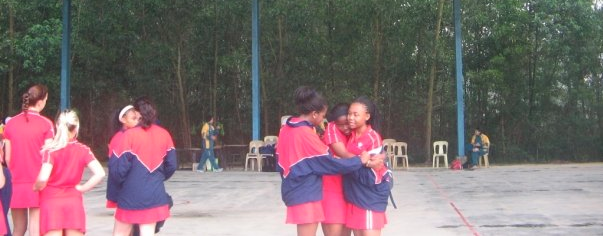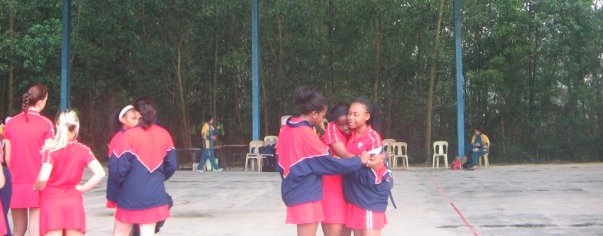Boys at my Christian primary school in Johannesburg were given the choice of soccer, cricket, athletics, or swimming. Netball, which was created as the women’s alternative to basketball in late nineteenth-century America but gained popularity in Britain and former British colonies, was one of the few sports available to girls. I’d never thought to question these slim pickings because I enjoyed the seclusion netball gave us. Our interactions with boys our age were characterized by either sporadic violence or intense observation, both of which were treated as signs they’d taken a liking to us, or so we were told. Though I did envy the freedom boys had to speak up and be silly in class, I was grateful not to be subjected to the bruises and scars that were a rite of passage in male sports.
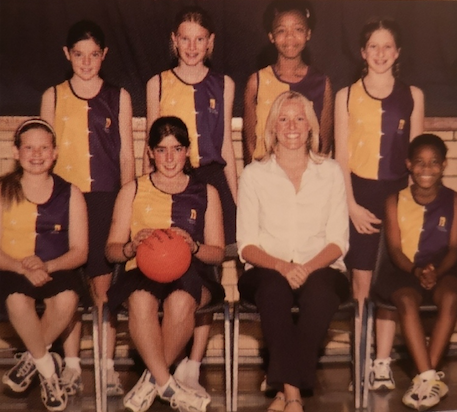
Netball was a game for the girl’s girl. It had the excitement and intensity of basketball without the complicated dribbling and unbecoming sweat. There was a sense of propriety to its rules which revealed the limitations placed on how women move through the world. You weren’t allowed any physical contact with other players. You could only take two steps when you had the ball in your hands. You had to stand three feet away from a player when you defended them. And depending on your position, you were restricted to a certain area of the court. It took some time to adjust to these rules. But soon they came to feel natural. Netball was something we created friendships and community around. It was our own private club and we didn’t have to share it with anyone.
We’d spend the last few minutes of warm-up before a netball match praying. We’d thank God for the beautiful day he’d made. We’d ask Jesus to protect us from injury and guide us to a win, or at least a respectable loss. We’d hope to befriend our opponents during our 30 minutes of playing, knowing this was impossible but remembering our Lord made all things possible. We’d end our prayer with an “amen,” opening our eyes gingerly and whispering a few ad-libs on God’s various titles. (Jehovah-jireh and El shaddai were my favorites.) We’d then assume our positions on court, avoiding eye contact with the other team because we already knew what they were thinking: We’re going to beat these weird Christian girls with their spooky prayer circles and their polyester vests with white crosses down the middle.
We were not a good team but I was considered a good player. A growth spurt at age nine meant I towered over most girls, giving me the kind of advantage that’s often mistaken for talent when everyone is young and new to a sport. I intercepted balls just by stretching out a hand, and threw them with the power of several. I covered my three-quarters of the court with speed and ferocity. And I cheered for my teammates aggressively, celebrating every goal scored, even if we were losing.
Our coaches were always on the lookout for someone who displayed a rare, God-given talent which they could one day take credit for honing. While this isn’t unusual in sport, it felt like wishful thinking for a conservative Christian school that could barely scrape together a team. When a local businessman who owned a strip mall in the area purchased our school from the church which owned us, it galvanized our coaches and elevated our aspirations. The businessman wanted us to become an elite institution with state-of-the-art facilities that would rival those of palatial boarding schools tucked away in more exclusive pockets of the country. We felt like we’d finally arrived, and we were ready to leave the bush leagues for greener pastures.
Every practice was now treated as an opportunity to suss out who showed promise and flair, and who would spend the rest of their life playing in pub leagues designed for unfit corporates looking to burn off calories from the Saturday beer-and-burger special. After a particularly tense game against a neighboring school, I’d been called aside by my coach to discuss my “potential.” She said she could see me playing for the South African national team if I worked hard enough, and trusted in God and myself. I thanked her and left the court glowing from her praise. It wasn’t so much her words which made me happy, but the feeling of possessing a gift which no one else on my team had. I relished the thrill of being acknowledged by adults whose opinions seemed as sacrosanct as the Bible itself.
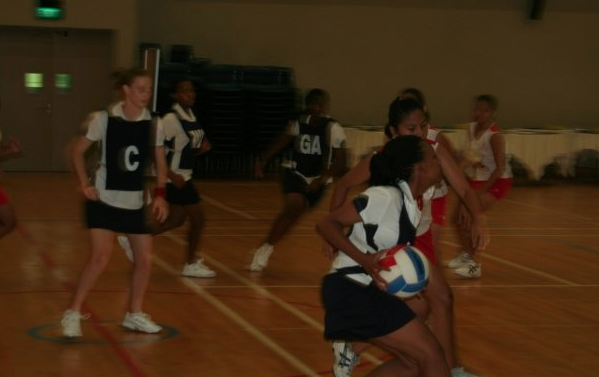
When the time came to go to high school, my mother decided it was best we go secular. She had misgivings about our school’s elaborate plans and claims (which indeed later turned out to be Infowars-level crazy), and she could sense I’d outgrown the moral condemnation my teachers would present as concern. I moved to the type of school the local businessman would’ve used as a model for what he wanted us to be. Located in the posh northern suburbs of Johannesburg, my high school was a place dedicated to the occupations of the smart and accomplished. People never admitted to working hard for their grades, but frequently complained of exhaustion. It was beneficial to be known as an all-rounder, but tasteless not to keep that drive and ambition discreet. And no one quite identified as rich, though they wouldn’t have called themselves middle-class either.
At my new school, you had to be a certain kind of good. There was an emphasis on playing a cerebral, thinking person’s netball. This was considered the province of white girls who supposedly brought more to the game than just physical ability. I’d always known I was a strong and athletic player but those appeared to be the only qualities my new coaches believed I had. I was never considered bad, but I wasn’t the right kind of good. I was the kind of good that everyone with hopes and ambitions grows to accept once their dreams let them down, and life offers less sparkling alternatives.
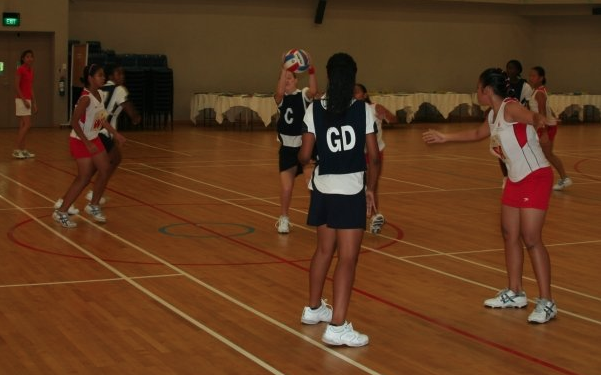
In the heat of a match we pooled together our respective strengths to get where we needed to be and we could almost forget about the coaches. But during practice and half-time, the playing styles of black players would face more scrutiny than those of white players. Once, in the second quarter of a neck-and-neck match with a rival school, I overheard my coach comparing me to another girl on our team, describing her as “smart and clever” while calling me “tough, solid, and fast.” I came to notice these expressions were mostly used to describe black players. They backhandedly recognized our talents, or at least the ones more obvious to the white eye, without threatening the alleged cognitive brilliance of our counterparts.
About three years into high school, I was playing for the first team and I’d made it to the final few rounds of netball trials for my province. The tryouts were held on a chilly Saturday morning in Boksburg, a city with a large Afrikaans population, east of Johannesburg. Some of the best teams we’d played against came from Afrikaans schools. There, the girls seemed to have been primed to play competitive netball ever since they’d laid eyes on a court. My chances of making the provincial team didn’t seem good, didn’t feel within reach because I hadn’t trained enough, worked enough, or wanted it enough.
About fifty of us sat on the court, waiting for the provincial coaches and umpires responsible for handling the trials that day to give us the details: what to expect, how long the trials would go on for, and when they’d announce the final squad. They then proceeded to deliver a set of warm-up drills and exercises in Afrikaans. The ten or so of us who couldn’t speak the language were confused. We didn’t know what we were being asked to do so we followed the lead of the Afrikaans girls running ahead of us, feeling too shy to tell them we didn’t speak Afrikaans, or to ask them speak to us in English or—this would really have been reaching for the impossible—a black South African language like isiZulu or Sesotho.
For me and the three other black girls, there was an additional issue. They were speaking to us in a language which was not only foreign, but carried the weight of a painful history, as our parents’ generation had protested Afrikaans as a medium of instruction in the Soweto uprisings of 1976. Talent may have brought us here but we knew our country better. Netball, like other historically white sports in South Africa like rugby and cricket, needed a racial facelift. Otherwise it would face disciplinary action from the department of sport and recreation. Our role on the team, because there could only be one, would be more decorative than participatory.
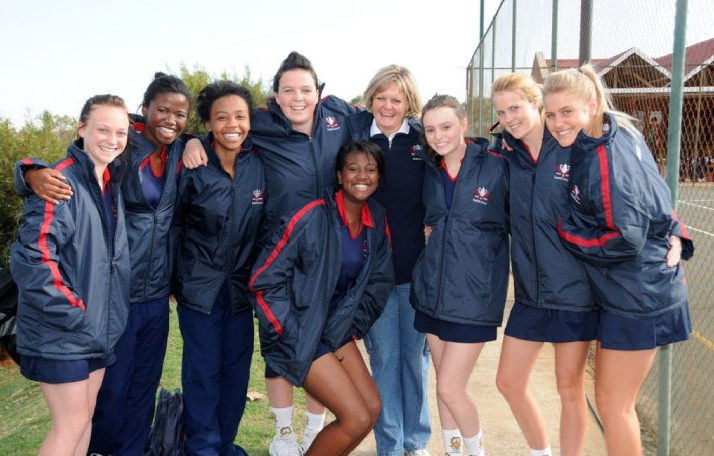
After warming up, we were put into positions and began to play. I had a subpar game, dropping the ball frequently and lacking the will or energy defend my opponents who’d zip past me to score a goal. I kept waiting for the final whistle to blow so I could leave Boksburg and forget about playing a sport which, like most things in South Africa, reflected the reality of a past it hadn’t come to terms with.
In retrospect, I’m not convinced that pace and power were all I or my other black teammates added to our team. Those labels, typically used to describe black players in other sport, restricted our playing potential to our bodies, and ignored anything else we had to offer to the game. Not only did this stop our full range of skills from developing, it also forced white players into a style of playing which may have been incompatible with their natural abilities.
I was undoubtedly tough and fast, but my game was also strategic, flexible, and perceptive. I executed different tactics on the court, created spaces for my teammates to score goals, and adapted my style of playing to suit the tempo of that particular game, and the players on that particular team. These things may have gone unrecognized by my coaches, but I realize they were felt by my teammates because all we had on that court was each other. We’d once been trailing behind a school which normally beat us, and one of our teammates, who wasn’t the strongest defender, intercepted the ball which she then passed to our goal shooter and that goal won us the game. We piled on top of each other, ecstatic, because we never thought we’d ever beat this school. In the end, it was those girls playing right next to me who appreciated my game for what it was, and their companionship and approval is what I valued then, and remember now.
